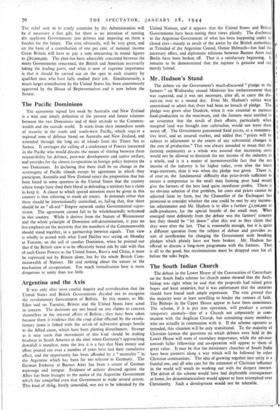The Pacific Dominions
The agreement signed last week by Australia and New Zealand is a wise and timely definition of the present and future 'relations between the two Dominions and of their attitude to the Common- wealth and the outside world. It starts from their immediate needs of security in the south and south-west Pacific, which require a regional zone of defence based on Australia and New Zealand, and extended through the long arc of islands from the Timor Sea to Samoa. It envisages the calling of a conference of Powers interested in the Pacific who would discuss the means of sharing between them responsibility for defence, post-war development and native welfare, and provides for the closest co-operation in foreign policy between the two Dominions. In declaring that there shall be no change in the sovereignty of Pacific islands except by agreement in which they participate, Australia and New Zealand reject the proposition that has been heard in some quarters in the United States that the country whose troops have shed their blood in defending a territory has a claim to keep it. A clause to which special attention must be given in this country is that referring to trunk air routes. It demands either that these should be internationally controlled, or, failing that, that there should be an " all-red " Empire network under Governmental super- vision. The agreement cannot fail to be wholeheartedly welcomed in this country. While it derives from the Statute of Westminster and the whole principle of Dominion self-determination, it puts no less emphasis on the necessity that the members of the Commonwealth should stand together, in a partnership between equals. That view is wholly in accord with what Lord Halifax was saying on Monday at Toronto, on the soil of another Dominion, when he pointed out that if the British view is to be effectively heard side by side with that of such Great Powers as the United States, Russia and China, it must be expressed not by Britain alone, but by the whole British Com- monwealth of Nations. He said nothing about the nature or the mechanism of co-operation. Too much formalisation here is more dangerous to unity than too little.


























 Previous page
Previous page